#prof stuff
Explore tagged Tumblr posts
Text
Overheard my creative writing student saying "I wanted to dress as harry du bois for halloween" and the three students around her sighed wistfully "harry du bois..." What is this
1K notes
·
View notes
Text

real
lmao NONE of those words are in the necronomicon 🤣
22K notes
·
View notes
Text
FOOL MASK (GITM BY @venomous-qwille)



Handbuilt porcelain with slip, overglaze, glaze, and gold lustre accents. Paint and lacquer detailing added post fire. Handsewn fool's cap and bells added post fire.
This mask is a part of a (loosely connected) mask series, all hand-built and fired using a range of different temperatures and techniques.
My favourite mask to date, Fool from Ghost in the Machine by the wonderful @venomous-qwille !! GITM is absolutely incredible and I cannot put into words eloquently how much I adore it and Fool so instead I made this mask! Hi!
My word was this mask a struggle to make. The mask itself is entirely one piece, and entirely porcelain!! That's right, those long thin rays are solid porcelain!! The eyes and tips of the blades are done in 22 carat gold lustre. All colouring save for the black and the satin sections of darker red on the face were done with only slips and underglazes. The red colour was correct without the paint, but I thought a contrast from the rest of the gloss would look nice :)
Made to scale, the mask measures 50.8x60.96cm without the hat, and 50.8x116.84cm with it! (20x24in without hat, 20x46in including hat). He is Large, but turned out absolutely lovely and I send my many many thanks to the kiln gods for producing him unscathed.

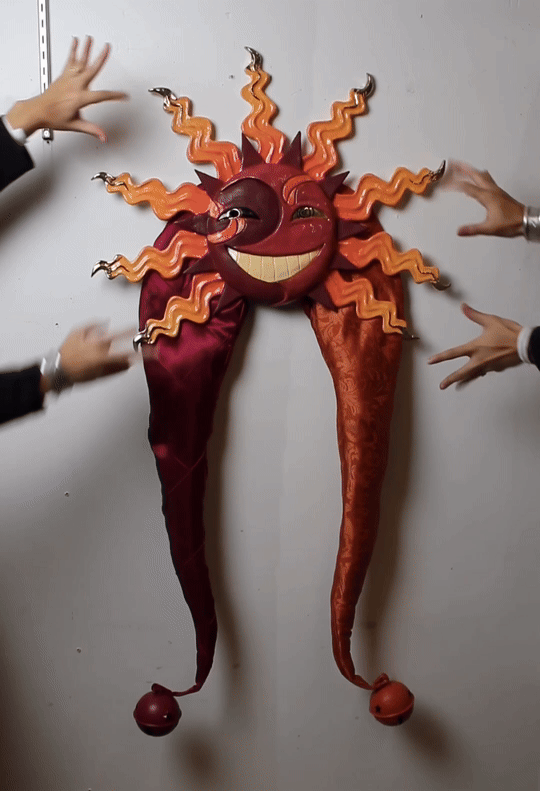
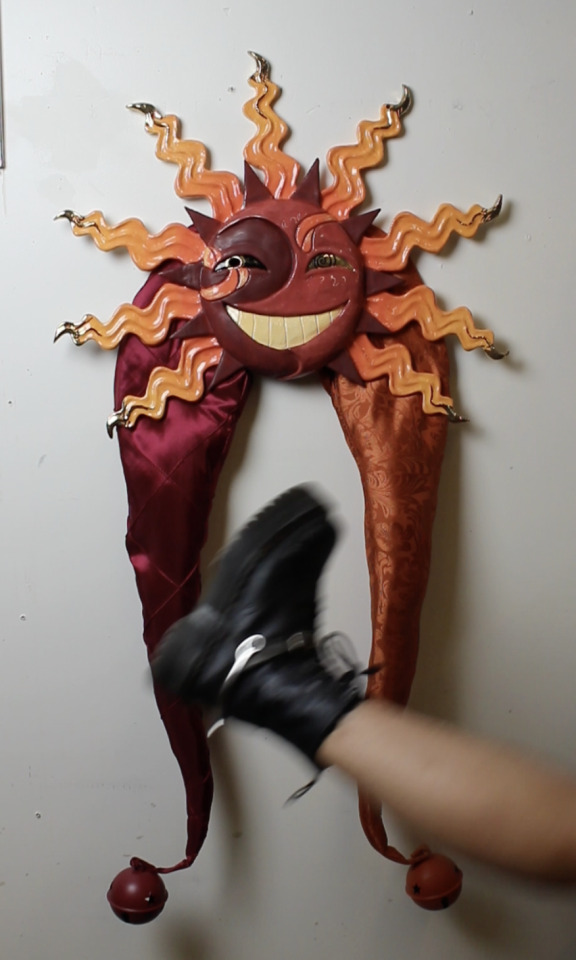
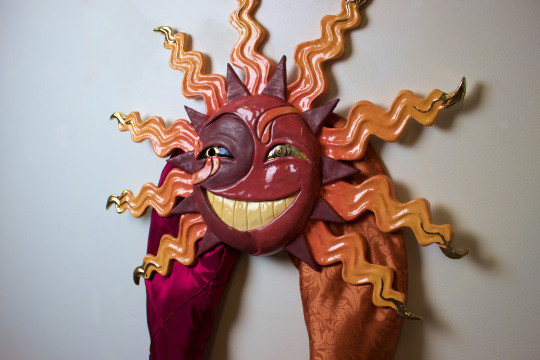
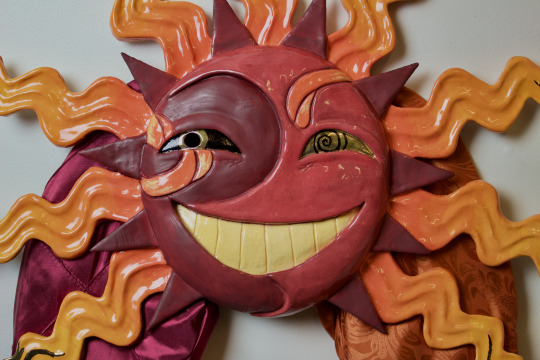
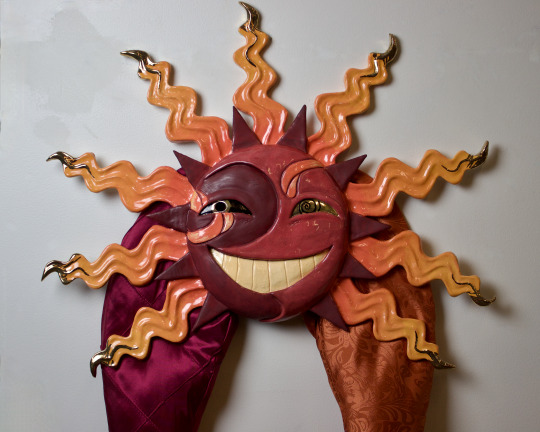

(naku & wall for scale)
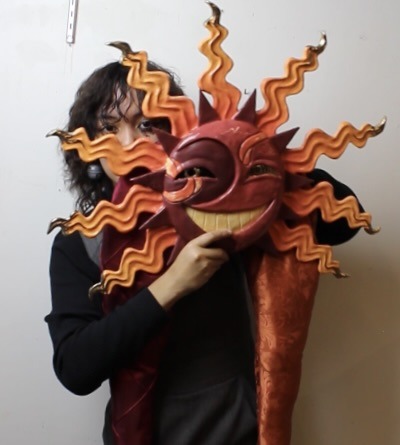
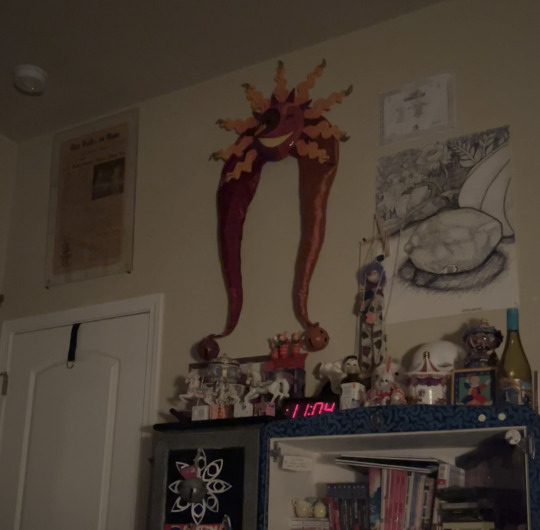
(he's so big guys i have large walls (the top of my head is only slightly above the top of the bookcase beneath him) look at him at the wall it's nuts)
#eyenaku#proudnaku#seriously so proud of this naku please interact with this my magnum opus of porcelain i hate porcelain but i love fool#my prof. encouraged me to make THE REST OF FOOL?? LIKE HIS BODY?? thats so much. i'm not gonna but that was a funny thing to experience#ANYWAYS HI QWILLE IF YOU'RE READING THIS THE TAGS!!#fool is such a guy#thas all! love ur stuff btw#art#pottery#ceramics#mask#masks#decorative masks#porcelain#fool#fool gitm#fool ghost in the machine#ghost in the machine au#fool eclipse#ghost in the machine#gitm au#gitm fool#eyenaku masks#hehe happy fool day#I think the funniest part of making him was the tactical smooch I had to make to save his face it’s a whole thing#clip next.
1K notes
·
View notes
Text
👔🪞

#i meant to post this yesterday oops#professor layton#pl#prof layton#luke triton#clive dove#my art#my stuff#jc leyendecker
148 notes
·
View notes
Text
Ok so a vast majority of us are familiar with the Gigantomachia arc in ORV but I took a classical myth class and obviously did my final project on ORV (bc it was to take a modern retelling of a greek myth and relate it to the original/classical myth version). But there are so many layers to Heracle’s involvement in Gigantomachia omg.
So in ORV, both the original myth of Gigantomachia and elements of Heracles’s myths are referenced during the Gigantomachia arc. The version of Gigantomachia in ORV most closely resembles Apollodorus's account from the 2nd century BCE. (This is also the Gigantomachia myth that my professor had my class examine)
For those unfamiliar with Apollodorus’s telling, Gaia, angered by Olympus’s victory over the Titans, enlists the help of Ouranos to birth the giants and exact revenge on the Olympians. The giants, invulnerable to the gods alone, wage war on Olympus. Gaia also tries to make the giants invulnerable to humans as well with a special herb but Zeus manages to get it before she can. Recognizing their limitations, the Olympians call upon Heracles, who deals the killing blow to the giants, securing Olympus's victory. (very similar to the version in the Percy Jackson Gods and Heroes book for those who know)
For Heracles, the way he’s portrayed in ORV deviates significantly from the original myth. In classic Greek mythology, Heracles is a demigod and son of Zeus. He commits some Greek crimes and has to do 10 labors for his evil asshole of a cousin that's also a king. However, in ORV, Heracles is not a real hero but a construct—a composite of stories curated by Olympus to create the ultimate soldier. Heracles is not a constellation or incarnation, but rather a tool made to be used in Gigantomachia. The decision to portray Heracles as a construct stems from the Greek mythological timeline. According to Greek myth, Heracles was born after Gigantomachia and therefore could not have realistically existed during the events of Gigantomachia; however, Heracles does appear in Gigantomachia. (In class we were told to disregard this discrepancy and chalk it up to it being myth and fiction.) However, ORV addresses myth like it is reality. Yoo Sangah asks about this inconsistency, which allows reader’s to clue into what Kim Dokja already knows (from having read WOS NOT because he has a background in greek myth like Yoo Sangah does)
Furthermore, in my class, we discussed how in classical myths, Zeus created Heracles to enforce xenia on Earth. Xenia is the ancient Greek concept of being good to strangers. It’s basically the “love thy neighbor” of Ancient Greece, only more extreme. (Can’t turn away strangers because what if it’s Zeus or a different god, etc.) In ORV, the creation of Heracles differs with “Zeus, the god of lightning, had sowed his seed in preparation for Gigantomachia. As always, the 'seed' here was a metaphor. Zeus feared the giants and collected miscellaneous hero stories from across the world.” (ORV Chapter 330: Ep. 62 - God's Enemy, III). Zeus takes these hero stories and fragments and turns them into Heracles. These fragments include the 12 tasks and come together to create the story that is Heracles. But even though the way Heracles has been created has changed, he is still made for the same purpose. And that is to be a weapon and tool for Zeus to use to enforce his ideals.
With how ORV reimagines Gigantomachia as a recurring scenario staged by Olympus to prevent the giants from rising again. Each repetition of the scenario ensures Olympus's victory, reinforcing their dominance and the story. Due to this fact, Olympus creates Heracles as a weapon and retells the story of their success as a way to manipulate the system. The gods perpetuate the Gigantomachia narrative not only as a tool for victory but as a fabricated story made from fragmented myths. By repeatedly telling this false version of Gigantomachia, Olympus solidifies its victory anecdote within the scenario, ensuring their triumph against the giants every time. According to Kim Dokja, "Once it becomes a story, it can be said to originally exist. Isn't it amazing?" (ORV Chapter 330: Ep. 62 - God's Enemy, III). In other words, ORV explains how a “false” tale can become a real story. This accounts for how traditional Greek mythology describes Olympus’s victory through the involvement of Hercules despite the clear timeline discrepancies, as seen in Apollodorus’s The Library of Greek Mythology, Book I, The revolt of the Giants, “The others [giants] were destroyed by Zeus, who struck them with thunderbolts; and all of them, in their death throes, were shot with arrows by Heracles.”
In addition, in older tellings of the world’s creation, Gigantomachia does not exist or is not written. For example, in The Theogony by Hesiod, Gigantomachia doesn’t exist. The Theogony was written before The Library of Greek Mythology, meaning that with how Heracles is a false story in ORV and was likely created for Gigantomachia then it makes sense for Gigantomachia to have been a story that became popular or well known later due to the effect of repeating Gigantomachia so that Olympus wins.
I don’t know, this is a really long ramble but I think it’s amazing how Shingshong can take classical greek myth and it’s inconsistencies to create a new and compelling story about Olympus. It’s the perfect blend of familiar well known myths with a well done twist to it from how the Star Stream functions. It’s also just super impressive to me how well thought out the whole Giganotmachia arc is since I would have never realized how much thought went into ORV’s version of Heracles if I hadn’t taken this college class.
#i swear taking this class was one of the best things ive done in college bc orv#but in all honesty#idk how many orv fans know this about the gigantomachia arc#bc i read a shit ton of percy jackson and had a bit of a greek myth phase but i never really realized or put together all of this until#i was in lecture and my prof was talking about heracles#god i love orv#orv#omniscient reader's viewpoint#kim dokja#yoo sangah#orv meta#also this is just a really shitty informal remake of my final project for the class lol#(i had to take out a bunch of context stuff that was in there for my prof)
97 notes
·
View notes
Text

I've been playing a buncha No Man's Sky lately and decided to draw my character from it
Yayyyy!!
#raymooart#raymooocs#no man's sky#nms#nms oc#or smth#the pose is pretty fire methinks perhaps I have been learning stuff in art school#yeah I'm in art school now#yayyyyy#my poor profs have to put up with my stupid fagass yuri#sorry for being a raging lesbian#it will happen again#with this I shall now die for a million years yet again#it is the natural law of my existence on tumblr
88 notes
·
View notes
Text


college AU or something idk, i just wanted an excuse to draw them again
#no individual panels because i'm lazy :3#about to do another rewatch of the movies hehe#do ya'll think arkin could reasonably be an art professor#ik for a fact asa would be a biology prof#asa emory#the collector fanart#the collector#arkin o'brien#collectkin#if you squint#ALSO GUYS#THE SEMESTER IS FINALLY OVER#i now have time to work on my own stuff again#expect another surge of art#*evil laughter ensues*#my art#fanart
70 notes
·
View notes
Text
Spirit World nitpick but I do think it matters. Xanthe always refers to John as "Constantine" as if they're contractually obligated to say his surname like it's his registered superhero name when it's just his name. Why can't they ever refer to him as "John"?

A really weird side effect to the superhero-ification of John Constantine and making his surname essentially his hero title is that in stories like this, it accidentally and definitely unintentionally enforces a racist and sexist dynamic to how you refer to other characters in the story. Cassandra Cain is called either "Batgirl" or "Cass", but never "Cain". Xanthe Zhou is called "Xanthe" but never "Zhou". In a story where Johnstantine is the token white guy, it's kinda weird that he's the only one consistently referred to by his surname.

It even continues into the Pride comic the two appeared in. I know it can be argued that Xanthe is referring to John this way because he's older, but it's not consistent with how they've referred to other Asian adult or elder characters in Spirit World. It also makes it harder to buy that John and Xanthe are friends when they're not even on a first name basis. Idk, I think it would be cute if Xanthe had familial honorifics for John in some way or a cultural nickname. Make it fun outside of calling John "old man" all the time. Where's the imagination.
#ramblings#jesncin dc meta#i think about how in college the white guy profs were called by their surname and the women plus men of color were called by first name#this habit dates back to patriarchal objectification and slavery practices (a deliberate attempt to erase Black ppl's ancestry) so...#...let's just be critical of this stuff. little biases to be aware of.
92 notes
·
View notes
Text
i haaave to do my assignments.... i haaaaaveeeee to do them or ill have to drop out or something..... im behind on so much ive literally been ignoring everything cause i cant bring myself to do anything for uni rn but i have to....
#i feel sick at the thought of going to my profs now cause I've been gone for so long ughhhh#i still don't know if i should get some freaking... therapy about it or do i do something else idk#but it sucks and ive been upset about all my classes for so long now goddd i know#that if i just do all the stuff and just get it over with and go face my profs#ill feel better in the end but i cant get myself to do anythingggggggg#TwT#ughh I literally feel so bad i feel so bad#i just feel sick from the stress but it still doesnt push me to do anything TOT
54 notes
·
View notes
Text
Student wrote "I have no interest reading about bad people doing bad things" in their response to the book
#prof stuff#but... you just read Lolita and you really enjoyed that...#is it because the bad characters are women now 🤔
277 notes
·
View notes
Text
„Nobody leaves this room until we’ve found my ring!“
Oh, great. Ava needs to be at the other end of the campus for her next class in fifteen minutes.
„Is he serious right now? It’s not our fault he lost his stuff.“ Doug, one of the other students dramatically rolled his eyes.
„Oh come on, have some sympathy. It’s probably antique and ridiculously expensive. Just help him find it and we can all be on our way.“
Just five minutes ago Ava was listening to Professor Gadlings lecture about early modern drama when he noticed the lack of his ring. One of the braver students had once asked him about his kind of uncharacteristically flashy ring he was sporting on his left hand.
The professor was known on campus as a very down-to-earth guy, almost suspiciously normal. Wearing cozy and practical clothes he always gave off the impression of a perfect son-in-law. In Ava’s opinion there was still a kind of mysterious aura about him but she never managed to put it into words. Not too much was known about him despite his cheery and social behavior.
It all added to his attractiveness. If one was into middle aged history professors…so basically at least half of the class had a crush on Mister Gadling and Ava surely was a leading member of the unofficial Dr. Robert Gadling fan club. For academic purposes only, of course.
That particular ring however didn’t seem like something the man would buy for himself. It was gold, beautifully carved and had a massive ruby embedded in the center of it.
It was just a touch too flamboyant for their professor that there had to be a story behind it.
But all he would give them as an answer was a sly smile and a cryptic comment about „how Shakespeare would die of jealousy if he could see him now.“
Said ring was now missing. When Gadling noticed his bare finger all hell broke loose.
Running his hands frantically through his hair, pulling it into a tight ponytail only to undo it seconds later. Crawling under his cluttered desk and painfully bumping his head in the process.
For a minute or two it was admittedly funny to watch the man sweat but now Ava just felt sorry for him. If she’d own such an obviously expensive piece of jewellery she would freak out too. Maybe it was an old family heirloom of some kind. The man owned all kinds of weird historic stuff, that much was for sure.
And apparently now they all had to help him find it if they wanted to leave this room anytime today.
So this is how Ava finds herself now on the surprisingly clean floors of lecture hall number five, looking for a shiny piece of metal along with her classmates.
Gadling seems to slowly but surely drift off into panic mode, spurring them on while turning every pocket of his trousers inside out, his hair sticking in every direction like one of the cartoon characters from her childhood. A mad scientist indeed.
“It has to be in this room! Keep looking! I can’t go home without it…and believe me when I say we’re all going to have a terrible night of disturbing dreams if we don’t manage to find it!” What is that supposed to mean, please?
Just as he’s about to flip his desk - yes, the very heavy and very antique looking desk - an unfamiliar voice breaks the chaotic atmosphere.
“Are you looking for something specific, professor? You seem quite distressed.”
And if Mister Gadling appeared ‘distressed’ before he’s outright shocked now.
In front of the old oak door leading into freedom - Ava can’t wait to finally leave this madhouse - stands the most gorgeous and posh looking goth prince she’s ever seen. Damn, those cheekbones alone are to die for, but his voice…dark, soothing, absolutely mesmerizing. The man looks regal even in a place that is anything but. That long flowing coat is a bit much though.
“Oh. You. Are here.” What happened to her eloquent professor?
“Indeed I am, Hob.” Hob? What kind of nickname is that?
“I mean why? Why exactly are you here? It’s just that you never visited before.”
Ava crawls back from under her chair to not miss a minute of whatever the hell this is.
She swears that Gadling - Hob, she remembers - starts to blush like a shy school girl. Who is that man that makes her professor lose his cool?
Meanwhile the rest of the classroom stopped the search for the ring, instead staring without shame at the play in front of them.
“My duties prevented me from visiting one of your lectures. I apologize for that. But you missed something of great value this morning. I thought you might want it back.”
And with that emo king (Ava really needs to find out that man’s name) calmly walks towards her professor, completely unaffected by his nosy audience.
Once he reaches the other man he gently takes his hand, opens it … and places a ring into his palm. Not just any ring, no.
The ring that “definitely has to be in this room”, as Ava recalls professor Gadlings voice. So much for that.
The stranger looks clearly amused at mister Gadlings obvious embarrassment.
“You left it next to the sink after washing the dishes. Then you realized how late you were and forgot to put it back on. I had to stop Matthew from hiding it under his pillow.”
Did Gadling have a cat? That man would surely get a cat and name it Matthew.
Gadling looks as relieved as he looks stressed by now.
“Thank you. I may have overreacted a bit.”
More than a few students agree on that but are too smart to make a comment.
That dark dream of a man fondly tucks a strand of hair behind their professors ear and wow, what’s happening? Ava tries to be as silent as possible to not ruin this moment. Her friends will never believe her.
Apparently Gadling finally found his voice again.
“You came all this way just to…”
“To take your wedding ring where it belongs, husband.”
And with that he places an almost chaste kiss on the other man’s lips and abruptly turns around to leave the - absolutely stunned and silent - room. Everyone is openly staring at poor mister Gadling now. Ava is pretty sure she saw one of the younger students filming or at least taking a picture of the whole thing. She’ll have to ask for evidence.
“Okay listen. None of this ever happened. You saw and heard nothing. Thank you for your help. Goodbye.”
Gadling quickly dismisses his students and almost flees the lecture hall.
Days later Ava still isn’t sure she witnessed a very elaborate fever dream
#I just love to embarrass hob#and I know Matthew isn’t a magpie but the idea of him stealing shiny stuff from dream didn’t leave me alone#he’s a little shit and I love him#hob is also the hottest prof on campus and dream is fed up with all the students dreaming about marrying HIS husband#dream of the endless#the sandman#hob gadling#dreamling fanfic#dreamling#my 2 am writing
155 notes
·
View notes
Note
What do you think of a TFA AU where Megatron and Starscream are Sari's true parents? XD
No, thank you... Sari would have so many issues if that happened! ^^;
How about instead an AU where Starscream faked his death during the Cybertron War, travels the galaxy and eventually ends up on Earth before the Autobots did...
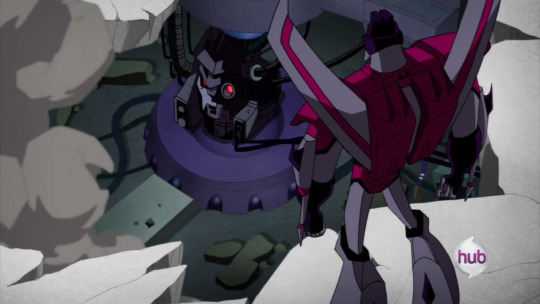
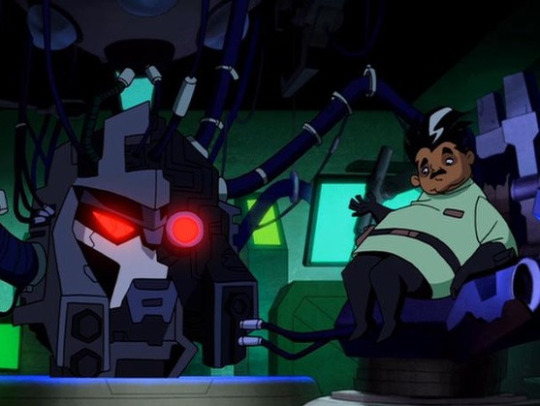
Starscream give himself a different name, creates a holoform then meets/befriends Professor Sumdac and helps the genius create his robot company, using Megatron's comatose head...
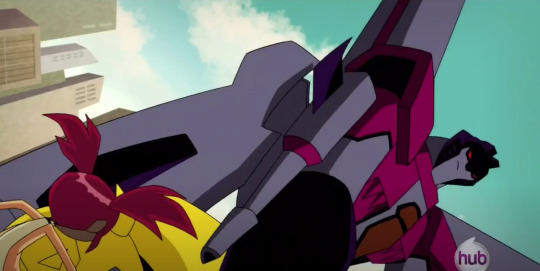
Starscream's holoform would later becomes Sari's uncle...
#because if megatron can be her dad in an AU then why can't starscream be her uncle?#starscream thinks that prof. sumdac using megatron's head to create his stuff is funny#the autobots don't know that sari's uncle is starscream until later#transformers#transformers animated#starscream#isaac sumdac#sari sumdac#megatron#optimus prime#autobot starscream
57 notes
·
View notes
Text
Nerdy cultural details about the word "Hashira"
Some details can be hard to pick up without context or in translation. I recently went over a few details about the Hashira's names, Breaths, or symbols, but today I want to focus on the word "Hashira."
To get this out of the way, I use "Pillar" all over this blog because I thought that's what they were called. I was astounded that phrase was not translated, as it is a (somewhat rare) case of a one-to-one translation equivalent. They are the pillars that support the Demon Slayer Corp, after all. The kanji for it (柱) very literally means "pillar" in any modern day Japanese to English dictionary. But since you all know the word "Hashira," let's climb up and see where it takes us! First, the kanji itself (brought over from China and given the Japanese pronunciation "hashira," based on the existing spoken Japanese language), is composed of 木 for "tree" and 主 for "master" or "main/principal," among other semi-literal or more widely applicable possible meanings in modern kanji dictionaries. However, Prof. Owada Tetsuo, a retired university professor who published an unofficial book of his own Kimetsu no Yaiba interpretations based on Japanese demon slaying folklore, points out that 主 can also be interpreted as a still flame atop a candlestick, and that 柱 (hashira) is a tree that cannot be moved. (I'll continue to use a lot of Prof. Owada's details in this explanation, as well as details I have picked up in other research.) That makes 柱 closely associated with holy trees found in, or treated as, Shinto shrines throughout Japan. As Shinto is a nature-based belief system, trees are often something that a kami (deity) will inhabit. Keep Shinto in mind, because we're going to focus on that a lot.
Before that, let's finish up with the kanji 柱. According to the first official fanbook, there is an upper limit of nine Hashira because there are nine strokes in the 柱 kanji. (See this dictionary entry for a breakdown of those nine strokes.)
Now that the easy official tidbit is out of the way, back to the Shinto fun stuff and conjecture! We need to dive a bit more into the spoken Japanese language, from which a lot of Shinto terms derive. For starters, the Japanese language uses counter words for when you say a certain number of beings or objects. You could think of this as "a sheet of paper" or "three rolls of tape." It is an annoying part of starting out your study of the language because there are a lot to memorize based on sizes, shapes, types of animals, etc. Deities also have their own counter word: 柱 (hashira). This goes to show how the Hashira of the Demon Slayer Corp are something more than human, what with how much power they possess.
Now if we think about the pronunciation of the spoken Japanese word from long before a Chinese written character was assigned to it, the "hashi" of "hashira" is a "bridge." Clever ones among you might know that "hashi" also means "chopsticks." But even chopsticks have the same effect as a bridge! They serve as a connection, bridging the gap between you and what was another living thing, that which will become a part of you as your sustenance. "Hashira," as pillars, are likewise something that serve as a connection, in this case, a vertical one. They are that which connect us with the heavens, or in the case of the Demon Slayer Corp, they bridge the gap between the limits of human strength and the inhuman strength of demons.
As another Shinto tie, one of the connections that Prof. Owada and I both made was that there are nine pillars that support the main sanctuary in shrine architecture like that of Izumo Taisha Grand Shrine. Or rather, in the case of at least one of the historical iterations of Izumo Taisha, there were nine groups of three massive tree trunks each, resulting in a shrine over 48 meters in height (see here for photos of how big the remains of those pillars are and how exciting the archaeology is). These pillars give you a sense of awe for just how powerful pillars can be, especially when you have a spread of nine to distribute the weight. Now, there's more that Prof. Owada and I would both say about how Izumo Taisha also ties in with the "Ubuyashiki" surname or the "yakata" title by which the Hashira address him, but that's a dose of nerdery for some other time.
#kny nerdery#kny reference#kny references#I forget which tag and I'm sticking it in there for the official fanbook bit#otherwise this is what My Research makes possible#thank you My Research#and thank you Prof. Owada's Research even though I think you're stretching too far to make connections#for the sake of talking about other nerdy folklore stuff in a KnY themed book
136 notes
·
View notes
Text

bread man
253 notes
·
View notes
Text
Adventures in Research: What do you mean "Bowl of Hearts"???
It starts simply; I was checking out the Heart Container page on the Zelda wiki (as anyone does) where I saw it "also known as Bowl of Hearts (TAoL)." Known as Bowl of Hearts? TAoL?? Uh no, it isn't??? I have read that manual quite a few times and I think I'd remember if it was called "Bowl of Hearts" as it is such a strange phrase. But I always have lots to learn so I put my pride aside and start to get to the bottom of this claim. Because hey, if this is true it's one more piece of AoL trivia I get to feel superior about knowing.
Link to the Zelda Wiki page
Naturally the first thing I do is that I look for the source of this particular claim. It comes from the Zelda Encyclopedia! Okay alright that means I have a lead. So, I hop on Google only to find that the only places I can find it is Internet Archive and Internet Archive is currently down due to some kind of cyber-attack. :| Fantastic. I guess I have to wait. To quell my interest, I double check the game where unlike in TLoZ, TAoL does not have an intro scroll with the names of the items. Additionally, I checked a text dump (link to that) of the game where it is only referred to as a "Heart." No bowls there. The manual is exactly as I remember it to be calling it "Heart Container" like normal.

(Zelda 2: Adventure of Link English Manual pg. 45)
I also see if I can find another source like a strategy guide which, yes it is still called "Heart Container."

(Nintendo Power January/February 1989 pg. 20)
So I put it aside until I get the wonderful news that Internet Archive is back and running!!! Yay! I rush over and check the Heart Container entry to find that yes, it does in fact say that TAoL calls Heart Containers "Bowl of Hearts."

(Legend of Zelda Encyclopedia pg. 127)
And so the Wiki did source it properly.... But my sources are also correct, no? So what's the deal? Why is this the first time I've heard of this phrase?
And thus I decide to go to the source: The Japanese Encyclopedia. Unfortunately, I could not find the Japanese version of the encyclopedia anywhere so I do the next best thing. I grab Google translate and start looking through the Japanese manual. Some things to note first:
I DON'T KNOW JAPANESE!
At all! And Google Translate is notoriously very finnicky when it comes to Japanese. So, I'm relying a lot on pattern recognition. (Also, apologies in advance if I mess up any of the Japanese here. Again, I don't know Japanese, and I am using Google translate.)
First stop is the TAoL Japanese Manual where it is referred to as ハートのうつわ.

(Zelda 2: Adventure of Link Japanese Manual pg. 48)
I stick that in Google Translate and seem to find the problem.
ハートの means "heart."
うつわ means "vessel, container or bowl." So maybe this can be translated as both "Heart Container" and "Bowl of Hearts" and it just depends on the context! As I lack all cultural and linguistic context I do the next best thing: check other manuals and see how they spelled it. The key here is that TAoL has been singled out for whatever reason. If the other manuals match this spelling something went wrong somewhere else.
I find the OoT Manual where it has... the same spelling?

(OoT Japanese Manual pg. 28)
And to double check I look at the OoA Manul and again:

(OoA Japanese Manual pg. 42)
Same spelling! So why was TAoL singled out? What a mystery...
I still can't find the Japanese Encyclopedia, so I keep looking. I look in the game to find that it is also referred to simply as "Heart" in the Japanese version (Underlined in pink).

(Youtube: "リンクの冒険 (FDS) 全クリア (ノーデス)" Time: 1:06:43)
I check a Japanese Strategy guide!

(The Adventure of Link Winning Guide pg. 17)
Its all the same(ish)! Where did this seemingly unique part of TAoL come from???
And I finally find it! I find a youtuber who has access to the Japanese Encyclopedia and I ask them to show the Heart Container entry.

(Youtube: "LoZ lore because you asked 1" Time: 0:10)
Note: It is hard to see but TLoZ is "ゼルダの伝説" while TAoL is "リンクの冒険" above with the in-game pictures.
And AH HA! You see that? That last portion that should refer to TAoL but is instead referring to the ORIGINAL LEGEND OF ZELDA???
It says that in TLoZ Heart containers are also referred to as "Heart Shaped Water Bottle" (ハートの水筒). And this is true as in the game they are referred to as "Container Heart" with the (イノチ ノ ウツワ) spelling while in the Manual they are referred to as "Heart Shaped Water Bottles" with the (ハートの水筒とハート) spelling.

(Youtube: "Zelda no Densetsu: The Hyrule Fantasy - FDS - No Commentary Playthrough" Time: 0:48)

(The Hyrule Fantasy: The Legend of Zelda Japanese Game Manual pg. 21)
So it was a mistranslation all along! Or so I hope... Because at the end of the day, why was it translated like this? What happened along the way to end up attributing the "Bowl of Hearts" translation to TAoL when I cannot find a primary source that refers to it as such. I believe the reason they did not translate the Japanese Encyclopedia entry directly to English is that it is not referred to as a "Heart Shaped Water Bottle" in the English translation. Then why single out TAoL? Is it because no one would doubt it or think to double check? Or is there some primary source out there that does refer to it as a "Bowl of Hearts"? I just can't know for sure. Ultimately, this doesn't matter that much, at the very most it's just annoying that it gets referred to as this in the wiki when there doesn't seem to be a primary source to back this claim. Oh well.
For now, I sign off! And wish you on your merry way. Thank you for reading or at least scrolling to the bottom.
Sources:
Zelda Wiki Hart Container entry: https://zeldawiki.wiki/wiki/Heart_Container
TAoL Text Dump: https://gamefaqs.gamespot.com/nes/563487-zelda-ii-the-adventure-of-link/faqs/20234
Zelda 2: Adventure of Link English Manual: https://www.nintendo.co.jp/clv/manuals/en/pdf/CLV-P-NAASE.pdf
Nintendo Power January/February 1989: https://shedevr.org.ru/zelda64rus/media/Zelda2_(Nintendo_Power_004)_(1989)_Jan-Feb.pdf
Legend of Zelda Encyclopedia: https://archive.org/details/TheLegendOfZeldaEncyclopedia/page/n119/mode/2up
Zelda 2: Adventure of Link Japanese Manual: https://archive.org/details/booklet_aol_jp/page/n47/mode/2up
OoT Japanese Manual: https://www.zeldadungeon.net/wiki/images/a/aa/Ocarina-of-Time-Japan-Instruction-Manual-Page-28-29.jpg
OoA Japanese Manual: https://archive.org/details/zelda-oracle-of-ages-j-cart-and-manual-ozidual/Zelda%20Oracle%20of%20Ages%20-%20Manual%2007%2009.jpg
リンクの冒険 (FDS) 全クリア (ノーデス): https://www.youtube.com/watch?v=VBsZTae_TTo&t=4003s
The Adventure of Link Winning Guide: https://archive.org/details/zines_zelda_famimaga_1987_aol_guide_600dpi/page/16/mode/2up
LoZ lore because you asked 1: https://www.youtube.com/shorts/gF3KRcwD3pU
Zelda no Densetsu: The Hyrule Fantasy - FDS - No Commentary Playthrough: https://www.youtube.com/watch?v=8-aYJyHgCy0
The Hyrule Fantasy: The Legend of Zelda Japanese Game Manual: https://archive.org/details/booklet_loz_jp/page/n19/mode/2up
#legend of zelda#zelda 2#adventure of link#long post#let me know any errors and I will fix them!! Peer review would be lovely.#yes this is what I have been up to since I've been away lol#this is why I don't allow myself to do heavy *historical* research; I always flip out over the littlest of detail and get so incredibly#sidetracked. I had to have a conference with my history prof last year because I was so stressed that there wasn't a straight answer???#broke my brain lol. which is weird because I deal with more squishy and interpretable stuff anyways? Its just different when there#technically is a correct answer. which is why I'm not a history major or something.#I read that manual wayyyy too much. I can identify on sight when people get some part of it wrong though. Useless skill that does nothing#for me. haha. I need to replay aol...
27 notes
·
View notes
Text
Self-indulgent agere board for carers! Charles & Erik 🥰🌻
((Also fun fact: the last box on the bottom right that says "Do what you enjoy" is a picture of the back of my jacket hehe))

⭐ Request Info • Masterpost ⭐

#i promise ill make boards for other characters soon i just love these sad gays so much#agere xmen#agere x-men#agere marvel#m: erik#m: magneto#m: charles#m: prof x#fandom agere#fandom agere boards#bugs alien stuff#agere charles xavier#agere erik lehnsherr#cg erik#cg charles#agere cherik
37 notes
·
View notes